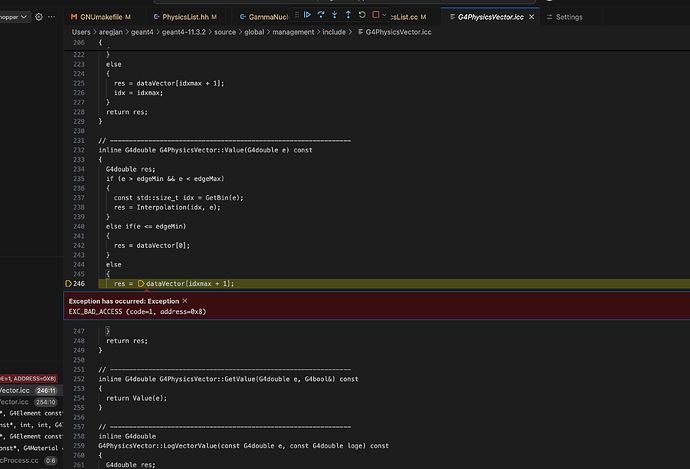Thanks for the prompt responses! After enabling verbose output, I found out that Geant4’s -DCMAKE_BUILD_TYPE=Debug merely sets -Og, not -O0. I had to pass additional flags at cmake stage (-DCMAKE_CXX_FLAGS_DEBUG="-O0 -g" -DCMAKE_C_FLAGS_DEBUG="-O0 -g") for a trully unoptimized build.
Sorry for the poor quality of the screenshot. I ran
>lldb -- ./hadrontherapy
here’s the end of the output, along with the backtrace. Thank you again for your help!
(lldb) target create "./hadrontherapy"
Current executable set to '/Users/aregjan/geant4/geant4-11.3.2-install/share/Geant4/examples/advanced/hadrontherapy/RUN/hadrontherapy' (arm64).
(lldb) run
[LOTS OF OUTPUT DELETED]
G4WT0 > Run 0 starts ...
G4WT3 > ### Run 0 starts on worker thread 3.
G4WT3 > HadrontherapyRBEAccumulable::Reset()
G4WT3 > HadrontherapyRBEAccumulable::Initialize(): 400 voxels.
G4WT3 > Run 0 starts ...
G4WT2 > --> Event 0 starts with initial seeds (86695069,72936749).
Process 58220 stopped
* thread #5, stop reason = EXC_BAD_ACCESS (code=1, address=0x8)
frame #0: 0x0000000101bb2df4 libG4event.dylib`G4PhysicsVector::Value(this=0x0000600001ce1ba0, e=0.17032601123969471) const at G4PhysicsVector.icc:246:11
243 }
244 else
245 {
-> 246 res = dataVector[idxmax + 1];
247 }
248 return res;
249 }
Target 0: (hadrontherapy) stopped.
(lldb) dataVector
error: 'dataVector' is not a valid command.
(lldb) print dataVector
(std::vector<double>) size=0 {}
(lldb) bt
* thread #5, stop reason = EXC_BAD_ACCESS (code=1, address=0x8)
* frame #0: 0x0000000101bb2df4 libG4event.dylib`G4PhysicsVector::Value(this=0x0000600001ce1ba0, e=0.17032601123969471) const at G4PhysicsVector.icc:246:11
frame #1: 0x0000000106aa6dd8 libG4processes.dylib`G4NeutronHPCaptureData::GetCrossSection(this=0x0000600000abe280, aP=0x00000001048f7930, anE=0x00006000013798c0, aT=293.14999999999998) at G4NeutronHPCaptureData.cc:236:49
frame #2: 0x0000000106aa69a4 libG4processes.dylib`G4NeutronHPCaptureData::GetIsoCrossSection(this=0x0000600000abe280, dp=0x00000001048f7930, (null)=6, (null)=12, (null)=0x0000600003181d40, element=0x00006000013798c0, material=0x00000001246f1f10) at G4NeutronHPCaptureData.cc:103:17
frame #3: 0x000000010642fb20 libG4processes.dylib`G4CrossSectionDataStore::GetIsoCrossSection(this=0x0000600000abf000, dp=0x00000001048f7930, Z=6, A=12, iso=0x0000600003181d40, elm=0x00006000013798c0, mat=0x00000001246f1f10, idx=1) at G4CrossSectionDataStore.cc:139:30
frame #4: 0x000000010642fa08 libG4processes.dylib`G4CrossSectionDataStore::GetCrossSection(this=0x0000600000abf000, dp=0x00000001048f7930, elm=0x00006000013798c0, mat=0x00000001246f1f10) at G4CrossSectionDataStore.cc:121:7
frame #5: 0x000000010642f838 libG4processes.dylib`G4CrossSectionDataStore::ComputeCrossSection(this=0x0000600000abf000, dp=0x00000001048f7930, mat=0x00000001246f1f10) at G4CrossSectionDataStore.cc:84:26
frame #6: 0x000000010647ca90 libG4processes.dylib`G4CrossSectionDataStore::GetCrossSection(this=0x0000600000abf000, dp=0x00000001048f7930, mat=0x00000001246f1f10) at G4CrossSectionDataStore.hh:155:5
frame #7: 0x000000010647c7ec libG4processes.dylib`G4HadronicProcess::DefineXSandMFP(this=0x000000010b1fb000) at G4HadronicProcess.hh:374:31
frame #8: 0x0000000106478604 libG4processes.dylib`G4HadronicProcess::UpdateCrossSectionAndMFP(this=0x000000010b1fb000, e=0.17028442121647913) at G4HadronicProcess.cc:919:5
frame #9: 0x00000001064784dc libG4processes.dylib`G4HadronicProcess::PostStepGetPhysicalInteractionLength(this=0x000000010b1fb000, track=0x00000001048f7d98, previousStepSize=0, condition=0x00000001049681d8) at G4HadronicProcess.cc:288:3
frame #10: 0x00000001009a6ebc libG4tracking.dylib`G4VProcess::PostStepGPIL(this=0x000000010b1fb000, track=0x00000001048f7d98, previousStepSize=0, condition=0x00000001049681d8) at G4VProcess.hh:488:7
frame #11: 0x00000001009a5360 libG4tracking.dylib`G4SteppingManager::DefinePhysicalStepLength(this=0x0000000104968050) at G4SteppingManager.cc:466:38
frame #12: 0x00000001009a4ba4 libG4tracking.dylib`G4SteppingManager::Stepping(this=0x0000000104968050) at G4SteppingManager.cc:187:5
frame #13: 0x00000001009baa30 libG4tracking.dylib`G4TrackingManager::ProcessOneTrack(this=0x0000600003899440, apValueG4Track=0x00000001048f7d98) at G4TrackingManager.cc:127:26
frame #14: 0x0000000101b7d2c0 libG4event.dylib`G4EventManager::DoProcessing(this=0x000060001d6bd0e0, anEvent=0x0000000103215240, trackVector=0x0000000000000000, IDhasAlreadySet=false) at G4EventManager.cc:216:23
frame #15: 0x0000000101b7e94c libG4event.dylib`G4EventManager::ProcessOneEvent(this=0x000060001d6bd0e0, anEvent=0x0000000103215240) at G4EventManager.cc:458:3
frame #16: 0x0000000102581088 libG4run.dylib`G4WorkerTaskRunManager::ProcessOneEvent(this=0x0000000104967d00, i_event=-1) at G4WorkerTaskRunManager.cc:203:19
frame #17: 0x0000000102580fc4 libG4run.dylib`G4WorkerTaskRunManager::DoEventLoop(this=0x0000000104967d00, n_event=316, macroFile=0x0000000000000000, n_select=-1) at G4WorkerTaskRunManager.cc:188:5
frame #18: 0x000000010258245c libG4run.dylib`G4WorkerTaskRunManager::DoWork(this=0x0000000104967d00) at G4WorkerTaskRunManager.cc:460:3
frame #19: 0x0000000102556614 libG4run.dylib`G4TaskRunManagerKernel::ExecuteWorkerTask() at G4TaskRunManagerKernel.cc:254:8
frame #20: 0x0000000102550ab4 libG4run.dylib`G4TaskRunManager::AddEventTask(int)::$_4::operator()(this=0x0000600002912fc0) const at G4TaskRunManager.cc:411:5
frame #21: 0x00000001025509c0 libG4run.dylib`std::__1::enable_if<std::is_void<void>::value, void>::type PTL::TaskGroup<void, void, 0l>::exec<G4TaskRunManager::AddEventTask(this=0x0000600002912fa8)::$_4, void>(G4TaskRunManager::AddEventTask(int)::$_4)::'lambda'()::operator()() const at TaskGroup.hh:548:13
frame #22: 0x000000010255095c libG4run.dylib`decltype(std::declval<G4TaskRunManager::AddEventTask(int)::$_4>()()) std::__1::__invoke[abi:ue170006]<std::__1::enable_if<std::is_void<void>::value, void>::type PTL::TaskGroup<void, void, 0l>::exec<G4TaskRunManager::AddEventTask(int)::$_4, void>(G4TaskRunManager::AddEventTask(int)::$_4)::'lambda'()&>(__f=0x0000600002912fa8) at invoke.h:340:25
frame #23: 0x000000010255074c libG4run.dylib`std::__1::__packaged_task_func<std::__1::enable_if<std::is_void<void>::value, void>::type PTL::TaskGroup<void, void, 0l>::exec<G4TaskRunManager::AddEventTask(int)::$_4, void>(G4TaskRunManager::AddEventTask(int)::$_4)::'lambda'(), std::__1::allocator<std::__1::enable_if<std::is_void<void>::value, void>::type PTL::TaskGroup<void, void, 0l>::exec<G4TaskRunManager::AddEventTask(int)::$_4, void>(G4TaskRunManager::AddEventTask(int)::$_4)::'lambda'()>, void ()>::operator()(this=0x0000600002912fa0) at future:1706:12
frame #24: 0x0000000102533c68 libG4run.dylib`std::__1::__packaged_task_function<void ()>::operator()(this=0x0000600000af7750) const at future:1892:12
frame #25: 0x0000000102533a60 libG4run.dylib`std::__1::packaged_task<void ()>::operator()(this=0x0000600000af7750) at future:2094:9
frame #26: 0x00000001025339ec libG4run.dylib`decltype(std::forward<std::__1::packaged_task<void ()>>(fp)()) PTL::impl::apply<std::__1::packaged_task<void ()>, std::__1::tuple<>>(_func=0x0000600000af7750, _args=size=0, (null)=PTL::impl::index_sequence<> @ 0x000000017002abce) at CxxBackports.hh:122:12
frame #27: 0x00000001025339c0 libG4run.dylib`void PTL::apply<std::__1::packaged_task<void ()>, std::__1::tuple<>>(_func=0x0000600000af7750, _args=size=0) at CxxBackports.hh:137:5
frame #28: 0x0000000102530de8 libG4run.dylib`PTL::Task<void>::operator()(this=0x0000600000af7718) at Task.hh:168:13
frame #29: 0x0000000102fbbed0 libG4ptl.3.dylib`PTL::ThreadPool::execute_thread(this=0x00000001246f1800, _task_queue=0x0000600000f7a060) at ThreadPool.cc:821:17
frame #30: 0x0000000102fbb2ac libG4ptl.3.dylib`PTL::ThreadPool::start_thread(tp=0x00000001246f1800, _data=0x00000001246f1928 size=4, _idx=4) at ThreadPool.cc:102:9
frame #31: 0x0000000102fd0860 libG4ptl.3.dylib`decltype(std::declval<void (*)(PTL::ThreadPool*, std::__1::vector<std::__1::shared_ptr<PTL::ThreadData>, std::__1::allocator<std::__1::shared_ptr<PTL::ThreadData>>>*, long)>()(std::declval<PTL::ThreadPool*>(), std::declval<std::__1::vector<std::__1::shared_ptr<PTL::ThreadData>, std::__1::allocator<std::__1::shared_ptr<PTL::ThreadData>>>*>(), std::declval<unsigned long>())) std::__1::__invoke[abi:ue170006]<void (*)(PTL::ThreadPool*, std::__1::vector<std::__1::shared_ptr<PTL::ThreadData>, std::__1::allocator<std::__1::shared_ptr<PTL::ThreadData>>>*, long), PTL::ThreadPool*, std::__1::vector<std::__1::shared_ptr<PTL::ThreadData>, std::__1::allocator<std::__1::shared_ptr<PTL::ThreadData>>>*, unsigned long>(__f=0x0000600002ab6768, __args=0x0000600002ab6770, __args=size=1, __args=0x0000600002ab6780) at invoke.h:340:25
frame #32: 0x0000000102fd07d4 libG4ptl.3.dylib`void std::__1::__thread_execute[abi:ue170006]<std::__1::unique_ptr<std::__1::__thread_struct, std::__1::default_delete<std::__1::__thread_struct>>, void (*)(PTL::ThreadPool*, std::__1::vector<std::__1::shared_ptr<PTL::ThreadData>, std::__1::allocator<std::__1::shared_ptr<PTL::ThreadData>>>*, long), PTL::ThreadPool*, std::__1::vector<std::__1::shared_ptr<PTL::ThreadData>, std::__1::allocator<std::__1::shared_ptr<PTL::ThreadData>>>*, unsigned long, 2ul, 3ul, 4ul>(__t=size=5, (null)=__tuple_indices<2UL, 3UL, 4UL> @ 0x000000017002af7f) at thread.h:227:5
frame #33: 0x0000000102fd002c libG4ptl.3.dylib`void* std::__1::__thread_proxy[abi:ue170006]<std::__1::tuple<std::__1::unique_ptr<std::__1::__thread_struct, std::__1::default_delete<std::__1::__thread_struct>>, void (*)(PTL::ThreadPool*, std::__1::vector<std::__1::shared_ptr<PTL::ThreadData>, std::__1::allocator<std::__1::shared_ptr<PTL::ThreadData>>>*, long), PTL::ThreadPool*, std::__1::vector<std::__1::shared_ptr<PTL::ThreadData>, std::__1::allocator<std::__1::shared_ptr<PTL::ThreadData>>>*, unsigned long>>(__vp=0x0000600002ab6760) at thread.h:238:5
frame #34: 0x00000001875cdc0c libsystem_pthread.dylib`_pthread_start + 136
(lldb) print dataVector
(std::vector<double>) size=0 {}
(lldb) exit
![]()
